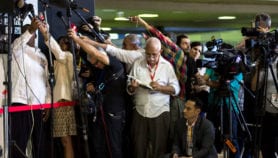Send to a friend
The details you provide on this page will not be used to send unsolicited email, and will not be sold to a 3rd party. See privacy policy.
What lessons has the climate science community learned from the University of East Anglia’s ‘climategate’ e-mails, the row over a mistake about glaciers by the Intergovernmental Panel on Climate Change and disappointment over the Copenhagen climate change negotiations?
The Yale Forum on Climate Change & The Media also asks climate scientists what lessons should they learn after a "challenging 12 months" and whether they are putting lessons learned into practice. It puts similar questions to a group of journalists covering climate issues.
Responses included the possibility, raised by Michael Oppenheimer, Albert G. Milbank professor of geosciences and international affairs at Princeton University, United States, that scientists, particularly younger ones, might avoid areas of research associated with public controversy, like climate change, or avoid interacting with government, media or the general public, even to explain the significance of their own research.
Several scientists referred to criticisms in phrases such as "organized campaigns of disinformation" or "powerful forces of unreason." Another common thread was encapsulated by Peter Gleick, president of the Pacific Institute, United States, with his comment that "every climate scientist (we’re supposed to be smart, eh?) has learned that e-mails must always be assumed to be completely public!"
Link to full article in The Yale Forum on Climate Change & The Media













